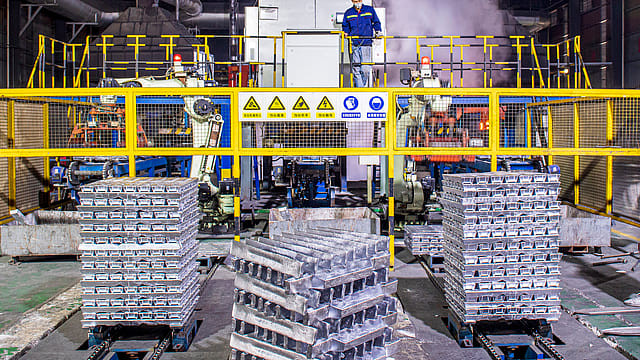EU carbon tax to have minimal impact on domestic aluminium producers: ICRA
ADVERTISEMENT

The European Union's proposed carbon tax is unlikely to have significant impact on domestic primary aluminium producers, as per the credit rating agency, ICRA. The CBAM (Carbon Border Adjustment Mechanism), a form of carbon tax acting as an import duty, is set to be implemented from January 1, 2026.
“Carbon Border Adjustment Mechanism (CBAM) ruling on European Union (EU) export will have limited impact on the domestic primary aluminium producers as the present notification covers the financial impact w.e.f. January 1, 2026, on direct process related emission, while excluding the indirect emission that generates ~80% of the total emissions in the primary aluminium production process,” ICRA says in a report.
Indirect emissions mainly arise from generating electricity used in the smelting process thereafter.
In the financial year FY23, India exported approximately 0.7 metric million tonnes (mmt) (24% of total exports) of primary aluminium to European countries. However, unlike steel, the carbon tax is not anticipated to significantly affect the export competitiveness of domestic primary aluminium players. CBAM taxes are projected to range from $50-140 per metric tonne between 2026 and 2034, which translates to 2-6% of current aluminium prices, it states.
January 2026
Netflix, which has been in India for a decade, has successfully struck a balance between high-class premium content and pricing that attracts a range of customers. Find out how the U.S. streaming giant evolved in India, plus an exclusive interview with CEO Ted Sarandos. Also read about the Best Investments for 2026, and how rising growth and easing inflation will come in handy for finance minister Nirmala Sitharaman as she prepares Budget 2026.
However, if indirect emissions are included in the future, the impact could be severe at $600- 700/MT (based on current carbon price), equivalent to 27-30% of current aluminium prices, due to domestic entities' heavy reliance on coal-fired power plants for electricity. The report notes that the inclusion of indirect emission is unlikely in CBAM until the electricity grid in the EU is entirely decarbonised.
To bring in a level playing field and avoid carbon leakage through imports, the European Union, being the second-largest global aluminium-consuming block, signed the CBAM regulations in May 2023, outlining tax imposition on embedded carbon imports from six sectors, including aluminium, steel, cement, hydrogen, electricity, and fertiliser.
The report further reveals that during CBAM's 'Transitional Phase' from October 1, 2023 to December 31, 2025, the focus will be on carbon reporting without any financial adjustment for EU importers. However, starting from January 1, 2026, EU importers will be required to purchase CBAM certificates corresponding to embedded emissions exceeding the EU Emission Trading System (EU-ETS) benchmark levels. The certificate prices will be tied to the weekly average carbon prices within the EU-ETS.
Following the transition period, the complimentary allocations offered to primary aluminium producers within the EU will gradually diminish in tandem with the introduction of CBAM from CY2026 to CY2034.
Over recent months, carbon prices in the EU have dropped due to reduced industry demand amidst macroeconomic uncertainties. Nevertheless, with European countries' commitments to achieving net zero emissions, carbon prices within the EU-ETS are anticipated to rise in the medium term.
